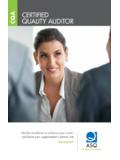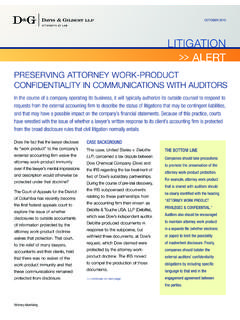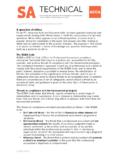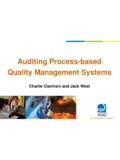Transcription of Corporate Collapse and the Role of Audit Committees: A ...
1 World Journal of Social Sciences Vol. 7. No. 1. March 2017. Pp. 19 29 Corporate Collapse and the Role of Audit committees : a case study of Lehman Brothers Abdullahi Adamu Dodo* This paper examined the roles and effectiveness of Audit committees (herein ACs) as provided by Corporate governance codes, in relation to Corporate failures, whether the failure is as a result of the ineffectiveness of the ACs. Given that the AC is perceived to be a means of strengthening the external financial reporting process and facilitating the detection and prevention of Corporate misconducts and scandals. It is believed that many financial and governance failures experienced in the recent past could be detected much earlier, had ACs been discharging their duties effectively. Secondary sourced data were used to investigate the roles of AC in the case of Lehman Brother s Corporate failure. A qualitative case study method was employed to carry out the study , by identifying and evaluating specific areas of interaction between ACs and other parties which affect Audit process.
2 The finding shows that many Corporate failures are associated with the ineffectiveness of ACs, and that ACs could have prevented the occurrence of several Corporate failures if they were efficient. However, the ACs cannot be 100% blamed for the failures, this is because their effectiveness is subjected to so many factors, and lack of any one factor always renders the AC ineffective. Some of the findings are consistent, while others are contrary to previous empirical studies on effectiveness of ACs. The study exposed specifically the process involved in the conduct of ACs in an organization and this add to the current debate on the need for improvement in the roles played by the AC as public gatekeepers. Keywords: Corporate Governance and Audit Committee 1. Introduction The contemporary Audit committees (herein AC) concept began in the late 1930 s when the US Security and Exchange Commission (SEC) recommended that publicly held companies form a Committee of non-officer board members that would assure the independence, Nomination and arrangement of engagement process of external auditor (Fichtner, 2009).
3 Afterward, the ACs played a vital role in the governing Structure of public companies (Oshima, 2005). In the last two decades ACs become a commonly used mechanism for good Corporate governance practice globally (Turley and Zaman, 2004). Many legislations and Corporate governance reforms have increased the responsibilities, tasks and expectations from the ACs (Bruynseels and Cardinaels, 2013). Thus, their effectiveness becomes an issue of concern to both researchers and regulators, the growing public pressure has placed a greater deal for emphasis on ACs role in pursuit of *Abdullahi Adamu Dodo, Department of Accountancy, Federal Polytechnic Bali, Taraba State, Nigeria Dodo 20 effective Corporate governance, the result from the investigation of collapsed companies indicated with clarity that almost every financial and governance failure, the world has experienced in the recent past could have been detected much earlier (Harrast, 2007).
4 Hence, this study figure out the actual role and responsibilities of ACs to understand the major determinants of effective discharge of ACs duties and to know whether the effectiveness of ACs will reduce the rate of Corporate Collapse and enhance the effectiveness of Corporate governance. This study explore the unexplored research area in ACs studies, to contribute to the case study research approach by illustrating the in-depth that can be derived from a case study approach, investigates the ACs process from within the organization and to see how organizational context affect the operational process of the ACs. The research specifically addresses some of the unanswered questions ACs research, therefore in view of the changing role/ responsibilities of the ACs the research focus on the following: a. Are Audit committees to blame for Audit / Corporate scandals? b. Will Audit committees prevent future Audit / Corporate scandals?
5 C. Are the Corporate scandals a reflection of ineffectiveness of Audit committees ? The paper is structured as follows: The paper begins with 1. Introduction to the research topic, followed by 2. Review of existing literature related to ACs, looking at the roles of ACs, effectiveness of ACs, the need for ACs. Then 3. Methodologies employed in the research with reference to quantitative and qualitative and the justification for choosing a particular method. Afterward, 4. Research findings, background of Lehman Brothers, the ACs of Lehman, results and evaluation of Lehman Brothers and answers to research questions review of financial reporting process, internal control and disclosure requirement, the use of Repo 105, responsibility for prediction and prevention of fraudulent act, availability of information and ACs roles , and finally 5. the conclusion and summary of findings. 2. Literature on Audit committees roles of Audit committees The need for ACs came amidst of unexpected Corporate failures that stem from Corporate misconduct (Mohammed et al, 2005).
6 ACs was non-mandatory structure used by few corporations on recommendations by court as means of settling allegations of Corporate misconduct. In recent years, a number of professional and regulatory commissions in the US, UK and many other countries have recommended the adoption of the concept and increased their advocacy on the expanded roles of the ACs. Notably are the Sarbanes-Oxley Act of 2002 in the US, the report of Australian treasury (2002), the recommendation of Smith Committee (2003) and the Higgs review (2003) in the UK (Turley et al, 2003). In 2008, a guide was issued in the UK on ACs elaborating the roles of ACs: monitoring and reviewing the integrity of financial statements and reporting judgements, review of internal controls where necessary and monitoring of effectiveness of internal Audit , recommendation of appointment of external auditors (EA) and associated cost, review of EA s independence and effectiveness and the development and implementation of policy.
7 Dodo 21 Noteworthy, the roles of ACs are based on different legislative traditions in different countries. For example, the roles of ACs have been undertaken by other bodies such as supervisory boards or the board of directors in some countries. Effectiveness of Audit committees Significant number researches established that the mere formation of AC in organization result in substantial benefits. For example Beattie et al (1999) found that the presence of AC is significant factor in enhancing third party perception of auditor independence. McMullen s (1996) further supports the above assertions. Goodwin-Stewart and Kent (2006) argued that ACs are associated with higher quality Audit . However, these findings are in conflict with the result of Beasley (1996) which concluded that the presence of AC has no significant effect on the likelihood of financial statement fraud and that interaction of the AC with board does not impact on the likelihood of financial statement fraud.
8 It was further suggest that the board composition is more likely to constrain fraud in an organization than AC. Peasnell eta al (2005) and Pucheta-Martinezand de Fuentes (2007) confirmed this argument. Da Silveira (2013) suggested that a new behavioural approach to Corporate governance focusing on the psychological aspects of human being inside organization need to be evolved. This suggestion came after a careful examination of eight cases of Corporate scandals by Hamilton et al, (2006). The Need for Audit Committee The continued changes in business environment, and increase in complexities of modern day corporations necessitate the need for the establishment of ACs to enhance the governance process of those corporations. Similarly, the growth and increase in Corporate activities result in increased risk and responsibilities of Corporate directors, the need to reduce the risk further increase the need for an AC as the means of reducing such risk.
9 Consequently, AC became an addition to the Corporate practice (Mautz et al, 1977 in Brenda, 1986). As more interest group evolve with keen interest on the activities of corporations, the AC is viewed as watchdog for the distance interest group who has no direct access to what is happening in those corporations. Those who argue on the need for ACs emphasized that AC ensures good relationships between directors, investors and auditors. AC also helps in the discharge of accountability and directors execution of their responsibilities. ACs influences power relations between accountability and auditing (Turley and Zaman, 2004). ACs are often perceived as an effective mechanism reducing agency cost and are expected to monitor the reliability of the company s accounting processes and compliance with relevant Corporate legal and ethical standards which includes maintenance and prevention of fraud controls (Hemraj, 2004 and Turley and Zaman, 2004).
10 However, many research on the ACs effect on Corporate governance revealed that it is not all of these perceived potentials were achieved by adoption of AC concept, rather in some cases the ACs aides the perpetration of most of the Corporate scandal the world witness either deliberately or out of non-commitment to their duties as prescribed in the governance Codes, like the cases of Enron in 2001 and number of scandals involving large US companies such as and global crossing (Sharma, 2009). Dodo 22 3. Methods The study is design to recognise the dynamic operation of ACs in an organizational context, which provides clear evidence on what is actually happening to ACs members in the process of discharging their duties. The study reviewed Secondary data from data banks, and analysed the details as they relates to the roles of AC s in the failure of Lehman. a case study allows for deep understanding of a situation (Creswell, 2007).



